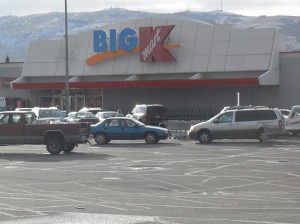30 October 2012, since my last posting (on 21 October 2012) about the ongoing Sears Holdings shut downs, there have been more store closings announced.
Also, Sears Holdings just announced they will be closing two parts and repair centers, both located in The Woodlands, Texas. At least 117 Texans will lose their jobs by 23 January 2013.
In Washington, on 23 October 2012 Bellingham Sears employees were notified that they will lose their jobs in January, however, the store management has known for months about the closing: “We’ve known since March of this year.”-Noelle Jorgensen, store manager
The latest announcements will mean 654 jobs will be added to the thousands already lost due to the Sears/Kmart closings.
In Canada, the newspaper, Calgary Herald, announced the winner of their 2012/13 Readers’ Choice Awards: Department Store, Appliance Store, Carpet Cleaners and Floor Coverings contest. According to the newspaper Canadians picked Sears!
This despite the fact that Sears stores are being closed in Canada as well. On 07 October one of the largest Sears stores in British Columbia was closed. 300 people lost their jobs (at it’s height of operation it once employed 800 people)!
Also in Canada, Sears Holdings announced it will reduce its 95.5% stake in Sears Canada, by selling its stocks to common stockholders. Sears Holdings wants to reduce its stake in Sears Canada to 51%.
Kmart has reported a 3.1% increase in sales, in Australia and New Zealand: “This is the 11th period in succession of solid comparable growth in transactions and units for Kmart as customers respond positively to its market leading pricing strategy and improved merchandise offer.”-Richard Goyder, Wesfarmers
Don’t you Yankees get your hopes up, Aussie and Kiwi Kmarts are not owned by Sears Holdings. They’re owned by an Australian company called Wesfarmers.
Here’s an updated list of Sears/Kmart closings:
Alabama: Gadsden Kmart, Mobile Sears Grand/Essentials, Auburn Kmart.
California: El Monte Sears Grand/Essentials, two San Diego Sears Grand/Essentials, Pleasant Hill Kmart.
Colorado: Broomfield Kmart, Glenwood Springs Kmart, Lone Tree Sears Great Indoors, Longmont Sears, Pueblos’ South Side Kmart.
Georgia: Macon Sears, Buford Kmart, Douglasville Kmart, Atlanta Kmart, Columbus Kmart, Jonesboro Kmart, Cartersville Kmart.
Florida: Fernandina Beach Kmart, Callaway Kmart, Orange City Kmart, Deland Sears Grand/Essentials, Stuart Sears Grand/Essentials, West Palm Beach Sears Grand/Essentials, Port St. Lucie Sears Grand/Essentials, Crystal River Sears, New Smyrna Beach Kmart, St. Augustine Kmart, Pompano Beach Kmart, Pensacola Kmart on Airport Boulevard closed in 2011, Jacksonville Kmart on 5751 Beach Boulevard and recently revealed second Kmart in Jacksonville on 4645 Blanding Boulevard (83 jobs lost), and the Ocoee Sears (102 jobs lost), Pensacola Kmart to be closed by 03 February 2013 (69 jobs lost).
Idaho: Lewiston Sears.
Floundering Sears at the GGP owned
Pine Ridge Mall in Chubbuck, Idaho.
Floundering Big Kmart in Pocatello, Idaho.
Are they next to go in Idaho?
Indiana: Anderson Sears Full Line, Saint John Kmart, Indianapolis Kmart.
Illinois: Melrose Park Sears parts and repair center, Fairview Heights Kmart, Freeport Kmart, Pontiac Kmart.
Iowa: Cedar Rapids Kmart, Davenport Kmart, Burlington Kmart.
Kansas: Lawrence Sears Full Line.
Kentucky: Middlesboro Sears Hard lines, Winchester Kmart, Hazard Kmart.
Maine: Lewiston Sears.
Maryland: Ellicott Sears Grand/Essentials.
Michigan: Brighton Sears Grand/Essentials, Harper Woods Sears Full line, Monroe Sears Full line, Adrian Sears Full line, Washington Township Kmart, Chesterfield Kmart, Woodhaven Kmart.
Minnesota: Willmar Kmart, Duluth Kmart, New Hope Kmart, White Bear Lake Kmart.
Mississippi: Jackson Sears Full line, McComb Sears Full line, Columbus Sears Full line.
Missouri: Lee’s Summit Sears Grand/Essentials, Saint Louis Sears Full line.
Montana: Missoula Kmart.
New Hampshire: Nashau Sears Grand/Essentials, Keene Sears Grand/Essentials.
North Carolina: High Point Sears Full line, Moorehead Sears Full line, Rocky Mount Sears Full line, Statesville Sears Full line.
New Jersey: Lawnside Kmart.
Ohio: Chagrin Falls Kmart, Springfield Kmart, two Toledo Kmarts, Medina Kmart, Columbus Kmart and recently revealed Zanesville Sears (67 jobs lost). Also, Van Wert Sears franchise bought out by Kirk Berryman, owner of Computer & Networking Technologies (CNT), who plans on moving the store to a new location.
Oregon: Roseburg Sears Full line.
Pennsylvania: Upper Darby Sears Full line, Pottstown Sears Full line, Pittsburgh Kmart, Wilkins Sears.
South Carolina: Sumter Sears and recently revealed Orangeburg Sears (approximately 50 jobs lost).
Tennessee: Antioch Sears Full line, Cleveland Sears Full line, Oak Ridge Sears Full line, Hendersonville Kmart, Morristown Sears Full line.
Texas: Two recently revealed Sears parts and repair centers closing in The Woodlands north of Houston (117 jobs lost). Update; I forgot to mention the ‘rebuild’ center in Garland northeast of Dallas (58 jobs lost).
Virginia: Norfolk Sears Full line, Midlothian Kmart, Richmond Kmart and recently revealed Lynchburg Sears (84 jobs lost).
Washington: Walla Walla Sears Full line, Lacey Kmart, Kelso Sears, and recently revealed Lakewood Kmart (59 jobs lost) and Bellingham Sears (92 jobs lost).
Wisconsin: West Baraboo Sears Grand/Essentials, Rice Lake Kmart.
On top of that, Sears Holdings sold stores to General Growth Properties, of which it has been reported that those stores will be closed.
It was recently announced that the Provo, Utah, store will continue operating as a Sears. Sears Holdings announced that GGP made a lease deal they couldn’t refuse, so they will continue running the GGP owned store.
Here’s the list of 11 Sears stores now owned by GGP:
Iowa: Coral Ridge Mall, and Mall of the Bluffs
Texas: The Woodlands Mall
Florida: West Oaks Mall
Utah: Fashion Place, and Provo Towne Centre (note the evil British empire way of spelling town & center)
Oklahoma: Quail Springs Mall
Hawaii: Ala Moana Center
Washington: Bellis Fair Mall
Minnesota: Apache Mall
Illinois: Market Place Shopping Center
In a side note, the Sears in Yuma, Arizona, was robbed of $45,000 USD of jewelry on 26 October 2012. According to Yuma Police, the early morning burglars also caused approximately $70,000 in damage breaking into the Sears.
Also on 26 October, a Detroit, Michigan, Kmart store reported thousands of dollars worth of jewelry as stolen. Police say it was a theft, not a burglary (in other words no body broke into the store).
In Greeley, Colorado, a man stole a car and smashed it into a Sears, then stole automotive tools. It was one part of the man’s larger smash and grab burglary spree.
Sears holdings is also suing a former executive for $700,000. They claim she breached her contract.

